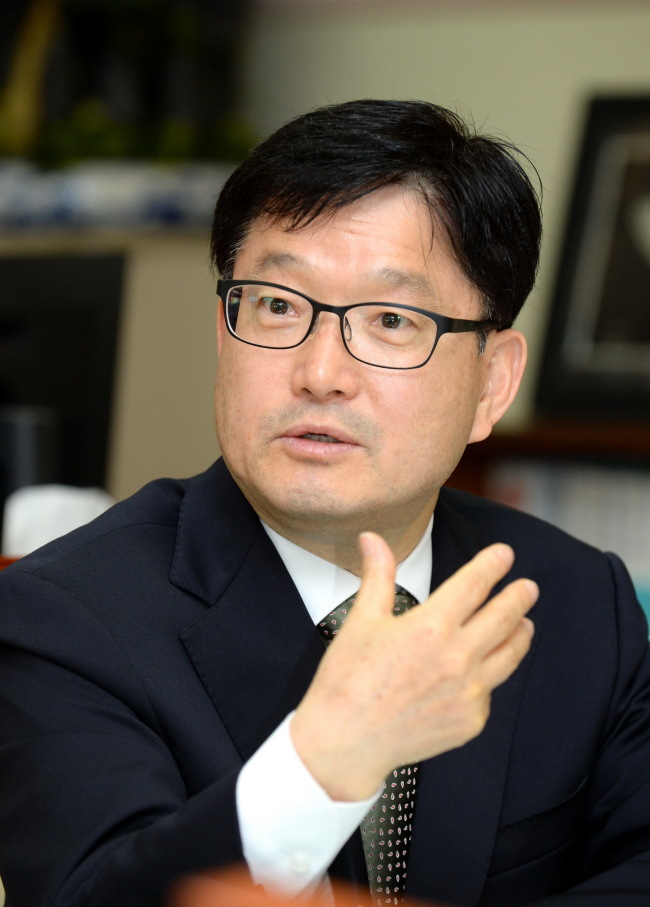Desertification, along with other environmental problems including droughts and water shortages, pose a serious threat to the human race. Experts now point out that the number of environmental refugees, which hit 50 million in 2010, could reach 200 million due to such environmental problems.
In order to slow down the desertification process, world leaders and environmentalists are proceeding with initiatives such as the Great Green Wall, which is aimed at creating a forest belt ― measuring 15 km in width and 7,100 km in length ― in the Sahara Desert.
The Korea Forest Service, a state-run forest management agency, is one of those active advocates for the environment.
Shin Won-sop, minister of the Korea Forest Service, said the Korean forest agency would beef up collaboration with other nations to stop desertification and share know-how with them in reforestation.
 |
Shin Won-sop, minister of the Korea Forest Service |
The following are comments on United Nations environmental initiatives and KFS’ protection plans for forests made by Shin in an email interview with The Korea Herald. ― Ed.
Global agreementsThe United Nations Convention to Combat Desertification, along with the United Nations Framework Convention on Climate Change and the Convention on Biological Diversity, is one of the three major environmental agreements among global governments.
The UNCCD was set up in June, 1994 after the United Nations Conference on Environment and Development held in Rio de Janeiro, Brazil, in 1992.
The agreement is aimed at providing support to those countries affected by desertification and droughts.
The “World Day to Combat Desertification,” was designated by the United Nations in 1997 to commemorate June 17, the day when the UNCCD was established, and to raise people’s awareness of desertification issues.
Korea and UNCCD
After the Korean government joined the UNCCD in 1996, the National Assembly ratified a relevant bill in 1999.
The Korean government since then has actively engaged in global efforts to prevent desertification.
In 2011, the Korean government hosted the 10th UNCCD Conference of the Parties in the city of Changwon, South Gyeongsang Province, at which global leaders pledged to take actions to protect the environment.
The government has also been working together with other countries and environmental institutes to raise awareness about the desertification taking place in East Asia.
At the Changwon UNCCD conference, South Korea introduced its reforestation programs, which have successfully enriched the greenery of the nation over the past 40 years.
Since this period overlaps with that of Korea’s economic development, both developed and developing nations are paying a great deal of attention to how the Korean government was able to accomplish this sustainable economic development.
KFS’ contributionThe Korea Forest Service has been running desertification prevention projects since 1997.
The so-called greenbelt reforestation project in Mongolia is a notable one, through which the KFS initially aimed to plant trees on 3,000 hectares of land from 1997 to 2016.
Other reforestation projects are also underway in China and Myanmar.
A project in Myanmar, which the KFS is conducting in hand with the Korea International Cooperation Agency, has also helped strengthen the ties between Korea and the Southeast Asian nation, especially in the forestry sector.
The Greening Drylands Partnership is an initiative co-led by the KFS, the UNCCD and the United Nations Environment Program to prevent desertification and land degradation in Africa, Asia, and Central and South America.
The government agency is also participating in the Desertification, Land Degradation and Drought initiative, an international project participated in by China and Mongolia to solve cross-border environmental issues such as yellow dust.
The agency often receives calls for collaboration and sharing experience in reforestation from foreign governments and environmental organizations.
The Korean government and the KFS deeply understand the need to cooperate with other global governments and agencies in helping developing nations solve environmental issues, and will make further efforts to stop desertification and land degradation by taking part in global environmental initiatives to expand forests around the world.
By Kim Young-won (
wone0102@heraldcorp.com)





![[Exclusive] Hyundai Mobis eyes closer ties with BYD](http://res.heraldm.com/phpwas/restmb_idxmake.php?idx=644&simg=/content/image/2024/11/25/20241125050044_0.jpg)
![[Herald Review] 'Gangnam B-Side' combines social realism with masterful suspense, performance](http://res.heraldm.com/phpwas/restmb_idxmake.php?idx=644&simg=/content/image/2024/11/25/20241125050072_0.jpg)

